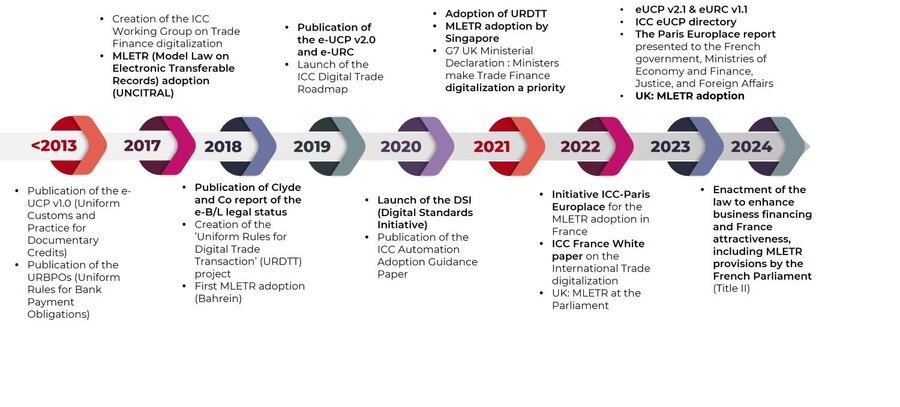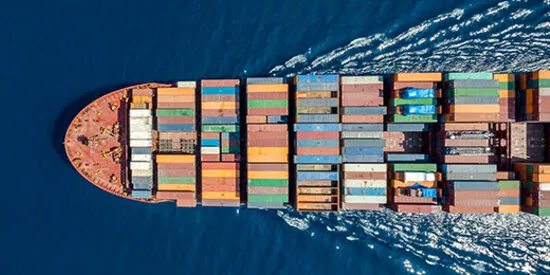
Trade finance: Towards a dynamic that accelerates the digital shift
In June 2024, France adopted the provisions of the MLETR. In 2025, a decree will formalize the digitalization of trade, bringing benefits to international trade. Who are the players in this digital transition? What challenges and stakes arise? Christian Cazenove, Group Head of Trade Oversight & Advocacy, and Alena Malgina, Trade Advocacy Correspondent, enlighten us on this topic.
In broad strokes, the global trade landscape continues to evolve rapidly, with goods and services’ trade numbering up to an all-time high of $33 trillion in 2024 [1]. Trade finance plays a crucial role in supporting nearly 20% of these trade flows by providing documentary trade solutions that address traders’ needs for risk mitigation, settlement, information, and financing, allowing them to operate with confidence [2]. Yet, despite its vital importance, trade finance is still weighed down by outdated, paper-intensive processes and cumbersome practices that hinder its efficiency.
Owing to efforts deployed by the trade ecosystem’s players, the tide is turning and digitalization disruption is gathering pace. Along with a regulatory push, trade finance stakeholders are driving change by embracing technology that offers new pathways to growth through innovation.
Trade Finance: Where Paper Still Reigns
Although many other activities, not limited to the banking industry, have since decades embraced digital solutions, trade finance remains bogged down by its reliance on paper. For each transaction, up to 36 documents and 240 copies are typically involved, resulting in an estimated 4 billion new paper documents per annum exchanged by banks [3].
Besides, compliance verifications against over approx. 400 ICC (International Chamber of Commerce) rules remains desperately manual and time-consuming, leading to a process that can take up to 12-15 days for a single ‘paper’ L/C, regardless of its amount and counterparts. These inefficiencies are costly for banks and business alike, making trade finance complex, risk-prone and unable to meet the growing expectations of corporate clients. Recourse to paper is historically due to the usage in trade of negotiable commercial documents (or transferable records) such as bills of lading, promissory notes, bills of exchange and warehouse receipts. These essential trade documents award their holders with rights that can be transferred. The endorsement and the transfer of rights requires however the original paper document to exercise via possession the rights that it represents. While creating an electronic document with an electronic signature is now easily achievable under French law, ensuring possession of the original of an electronic record seemed for a long time hardly feasible [4].
The UNCITRAL (United Nations Commission on International Trade Law), addressed this challenge by developing in 2017 the Model Law on Electronic Transferable Records(MLETR) - a legal technology-neutral framework that enables the use of electronic transferable records (ETR). If transposed into national legislation, MLETR grants these digital records functional equivalence to paper instruments and supports their legal cross-border recognition. The adoption of this framework is a necessary first step towards the digitalization of trade.
G7 Highlighting the Urgent Need for MLETR Global Transition
At the 2021 G7 Summit in London, governments recognized that paper-based international transactions were a significant source of “delay, inefficiency, fraud and error”. They declared their commitment to support digital trade to reduce the global trade finance gap, pushing for a wider adoption of the MLETR.
French stakeholders have been key drivers in advancing a much-needed law reform and thus digital transformation. In November 2022, the French government mandated the ICC and Paris Europlace with a joint mission to accelerate the digital transition. Their efforts led to a comprehensive report submitted to the government in June 2023, outlining 9 recommendations which focus on legal frameworks, trade tech ecosystems, improved stakeholder coordination and reinforced capacity building. Thanks to collaborative efforts within the industry, the MLETR provisions were enacted in June 2024. Their full applicability is expected in the first half of 2025 with the publication of an official decree that will allow the enforceability of the newly adopted provisions in France.
These efforts are crucial as the digitalization of trade finance can bring substantial benefits for the entire ecosystem, particularly for banks and their corporate clients. According to the 2023 report by the ICC – Paris Europlace, digital trade finance could generate up to €3.8 billion in gains for France alone, with an estimated €36 billion across Europe by 2030. Digital solutions have the potential to reduce processing times, costs, improve risk management, rendering trade finance more efficient, accessible and secure. For businesses, and especially SMEs, faster processing times and lower costs could enable a greater participation in global trade.
The benefits of digitalizing our international trade operations are clear. Digitalization will allow our recipient clients to retrieve their goods faster and avoid incurring parking fees at destination. As an intermediary trader, it is key to ensure commercial and logistic documentation is available before the goods arrive at the destination port. When documentation is not received on time, we end up bearing those expenses. Another challenge is to significantly reduce our shipping costs of original documents via secure courier services. In fact, the annual total cost of these reaches several hundred thousand euros. Franck DESCHAMPS – Head of Trade Finance, SNETOR.
Challenges to Digitalization: Interoperability & Harmonization
MLETR enactment in France represents a major step forward for the French ecosystem, but the challenge of international legal harmonization remains. To date, only ten countries have adopted this crucial piece of legislation, particularly Singapore (2021) and the UK (2023) leading the way.
The trade ecosystem currently faces another significant challenge to overcome on the trade finance digitalization path, that is the lack of technical interoperability between IT solutions deployed by the multitude of stakeholders involved to securely transmit data and electronic documents. So-called “digital islands” – isolated IT solutions adopted by closed groups of actors, complicate the scaling up of digitalization. The challenge of interoperability also extends to its semantic interpretation, as well to the future need for procedural interoperability across institutions to facilitate smooth transactions. A close engagement with different stakeholders is now essential to adopt industry-wide IT interoperability & other standards, to allow for a seamless data and document exchange across the trade ecosystem.
Looking Ahead: The Road for 2025 & Beyond
As digitalization must accelerate in 2025, all ecosystem players recognize its undeniable advantages. The question has long shifted from whether to digitalize to assessing our progress, identifying obstacles, and determining our path forward.
To sum it up, progress is not without challenges, as two major hurdles of legal harmonization and technical interoperability continue to loom.
On legal aspects
Although there is still a considerable path to traverse, the industry has made significant progress in recent years, with a host of initiatives dedicated to transforming and modernizing trade finance. 
More countries are anticipated to transpose the MLETR as the ICC works toward its ambitious goal of 100 MLETR compliant countries by 2026. Objectively, progress in legal adoption is slower than desired, yet the outlook is clearly positive: more countries engage in the discussions.
Region-wise, strong momentum for adoption exists in Europe and the APAC regions. In Europe, after UK and France’s adoption, promising dialogues are occurring in the Netherlands and Germany, while nascent discussions are taking place in Italy and Spain.
The year 2025 brings a glimmer of hope, particularly for MENA, as several high-level workshops and conferences on MLETR and trade digitalization have been held in Morocco, Qatar, and Egypt. While it is difficult to predict adoption timeframes, these countries may be next in line for legal reforms. A concern remains: although the African nations are notably known for their high recourse of ICC documentary instruments, most of these countries have yet to show any traction.
In France, the industry eagerly anticipates the publication of the adopted MLETR provisions’ application decree. The development of the decree has been slower than anticipated and stakeholders impatiently await it to move from proofs of concept to real usage cases.
On platforms and interoperability matters
The deliberation on tech platforms to adopt is still in its early stages and it is not yet sufficiently developed. Stakeholders remain hesitant to commit to a specific tool, but progress is gradually being made as some fintechs announce improvements in document flow interoperability and proofs of concept are rolled out by financial institutions. Certainly, advancements are underway; however, it is not yet clear towards which tech providers to gravitate, as legal and technological aspects remain foggy. 2024 marked a period of first attempts, with stakeholders across the globe rolling out PoCs (Proofs of Concept), laying the groundwork for 2025, which is expected to be a year of pilot transactions within the trade finance ecosystem in France.
Only a few banks, particularly Societe Generale, and some shipping companies show a proactive approach. Fintechs are certainly at work, but the entire ecosystem remains cautious.
Franck DESCHAMPS – Head of Trade Finance, SNETOR.
Contributing to the Digital Future
Societe Generale is actively involved in the trade finance digitalization movement. From its inception, we support the ICC - Paris Europlace Initiative to accelerate the adoption of digital solutions in France. Societe Generale actively contributes to the working groups the initiative created, namely to the Advocacy pillar, driving dialogue among stakeholders from across the whole trade community. Efforts are underway for the development of multiple PoCs with several commodity and non-commodity corporate clients and their banking counterparts worldwide to assess practical applicability of different tools and platforms as corporate interest grows, exploring new avenues to contribute to trade finance’s incremental transformation.
The critical areas we should expedite our efforts on are e-B/Ls, e-L/Cs and digital documentary collections. […] In a few months, everything will be put in place to start deploying new methods wherever possible. Clearly, the path will be long and will require patience and energy to convince our partners and find corridors that allow this deployment. Franck DESCHAMPS – Head of Trade Finance, SNETOR.
Yet, one must acknowledge that the pace of change within the trade industry remains slower than desired, and it is up to the entire ecosystem to sustain and reinforce this momentum. Key actions ahead are (i) to encourage adoption of favourable legal frameworks, such as those promoted by ICC DSI (i.e. KTDDE), (ii) to further promote dialogue within the industry, particularly with fintechs to identify the most effective interoperable solutions, and (iii) to strengthen cooperation between financial institutions across all geographies and finally allow digitalization to take hold.
Article written by Christian Cazenove, Group Head of Trade Oversight & Advocacy, and Alena Malgina, Trade Advocacy Correspondent.
Useful links:
1. UNCTAD. (2024). Global Trade Update (December 2024).
2. Wolfsberg Group, International Chamber of Commerce (ICC), & Bankers Association for Finance and Trade (BAFT). (2019). Trade finance principles: 2019 amendment.
3. Fletcher, A. (2019). Forget the paper trail — blockchain set to shake up trade finance. Financial Times.
4. With the generous contribution of Dominique DOISE, Partner at VATIER Law Firm.
5. G7. (2021). G7 Trade Ministers’ Communiqué.
6. ICC. (2022). Défis et opportunités de la digitalisation du commerce international – Livre blanc 2022.
7. ICC – Paris Europlace. (2023) “Accélérer la digitalisation des activités de financement du commerce international" and its English version "Speeding up the digitalization of Trade Finance".
8. ICC UK. Creating a modern digital trade ecosystem.
9. UNCITRAL. Model Law on Electronic Transferable Records (MLETR).
10. ICC DSI. (2024). Key Trade Documents and Data Elements.
11.Loi 2024-537 du 13 juin 2024 visant à accroître le financement des entreprises et l’attractivité de la France (see title II).




